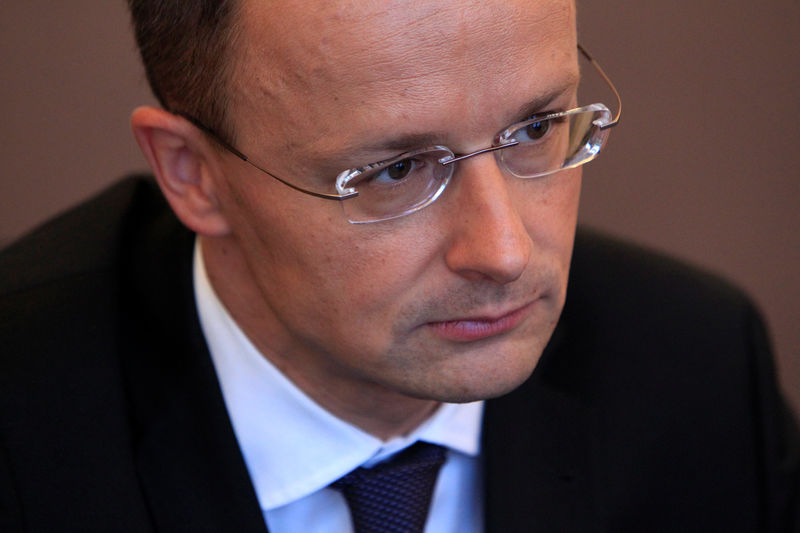By Krisztina Than
BUDAPEST (Reuters) - Hungary will not relinquish any of its national sovereignty to the European Union and will keep fighting against the EU's quota system for taking in asylum-seekers, Foreign Minister Peter Szijjarto told Reuters.
As the EU plunges into an intense debate over deeper integration after Britain departs in 2019, Szijjarto said giving up more national powers was not the way to go.
His comments highlighted the resistance that proponents of a closer and deeper EU - notably French President Emmanuel Macron - are likely to face from one of the bloc's most prickly and nationalist-minded members.
"I definitely do not share the approach ... that (the) less sovereignty on the level of the member states, the stronger the EU will be. I think it is a dead end street," Szijjarto said in an interview.
The right-wing government of Prime Minister Viktor Orban, which currently chairs the four-nation Visegrad group of Central European states, has been the most vocal opponent of EU migration policy and what it sees as attempts by Brussels to erode member states' sovereignty.
Szijjarto said one area where Hungary supported a common approach was defense, as having a European army would strengthen member states to the benefit of the entire bloc.
But taxation policy, for example, should remain with member states as that was a matter of competitiveness. Hungary has one of the EU's lowest personal income tax rates at 15 percent, and a corporate tax rate of just 9 percent.
When asked in the interview late on Tuesday if Hungary could accept a common finance minister and budget for the EU, Szijjarto said: "I understand if this is a scenario then first it only can be a scenario for the euro zone, and since we are not members of the euro zone, this question will be decided without asking our opinion."
On Wednesday, however, European Commission President Jean-Claude Juncker delivered an annual address in which he set out an economic vision including a finance minister for the whole EU.
Hungary has no target date to join the euro.
"WE ARE GOING TO FIGHT"
Szijjarto dismissed the idea that Hungary or Poland, which also has a eurosceptic government, were becoming isolated in the EU, or that Slovakia and the Czech Republic were drifting away from them within the Visegrad group known as the V4.
"There are many attempts to break the V4 unity but they are going to remain unsuccessful," he said, adding that the Visegrad states were firm in their position to reject migrant quotas after foreign ministers met in Estonia last week.
"Everybody reassured the others that we are going to fight and we are not going to give up our positions regarding illegal migration and regarding the quotas."
More than 1.5 million migrants and refugees have arrived in Europe since 2015, many fleeing war in the Middle East. The EU's highest court ruled last week that member states must take in a share of refugees, dismissing a challenge by Slovakia and Hungary.
German Chancellor Angela Merkel has urged Hungary to quickly implement the court ruling, but Szijjarto called it a "very dangerous" political decision.
"This decision does not oblige Hungary to anything because this decision was not about whether Hungary has to receive migrants from tomorrow onwards," he said.

"We will always fight against obligatory quotas, we will never hide our opinion that illegal migration poses a huge threat on Europe, and this position of ours remains our position, regardless of any kind of pressure that has been put on us."